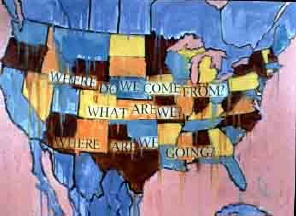American Indian
Literature: Resistance and Renewal

Jaune Quick-To-See Smith (Salish)
T H I S
I S I N D I A N C O
U N T R Y
Fall 2012 * TR
9:30 - 10:45 * TLC 023
|
American Indian
Literature: Resistance and Renewal
Jaune Quick-To-See Smith (Salish)
|
|
Bicultural Production: A text or object that retains the nature of the creator's original culture as well as influences from other cultures. Colonialism:
A policy by which a nation maintains or extends its control over
foreign dependencies (my note: this would be the case of the British in the
Americas, India, Africa, and Australia. When the settler in turn colonizes the
indigenous people this is sometimes called "internal" colonization or
colonialism such as in the U.S.). Dialectic: Originally developed by Greek philosophers, mainly Socrates and Plato, a form and method of logical argumentation that typically addresses conflicting ideas or positions; any mode of argumentation that attempts to resolve the contradictions between opposing ideas Dialogic/Dialogism: A theory developed by Soviet critic Mikhail Bakhtin that permits numerous voices or discourses to emerge and to engage in dialogue with one another (as opposed to a monologic, single voiced text). Dialogism makes any work polyphonic or polyvocalic, inevitably disrupting the authoritative voice. Historical Trauma Response: a theory of intergenerational trauma experienced by American Indian due to intense stress and no time to grieve or heal. Stressors are contact and colonialism, warfare, disease, forced removal, forced prohibition against language use and religious practices, compulsory boarding school, and ongoing discrimination and poverty. See Dr. Maria Braveheart Yellow Horse and Eduardo and Bonnie Duran. Imperialism: The policy of extending a nation's authority by territorial acquisition or by establishing economic and political hegemony over other nations. (Note: this is what the U.S. did when it overthrew Native Hawaiian government (King/Queen system) and took over; think also of the Philippines, Puerto Rico, etc.). Imperialist Nostalgia: a mood of nostalgia that makes racial domination appear innocent and pure; people mourning the passing or transformation of what they have caused to be transformed. Imperialist nostalgia revolves around a paradox: A person kills somebody and then mourns the victim; or someone deliberately alters a life form and then regrets that things have not remained as they were. . . Imperialist nostalgia uses a pose of "innocent yearning" both to capture peoples' imagination and to conceal its complicity with often brutal domination (R. Rosaldo, Culture and Truth: The Remaking of Social Analysis) Self-Determination: the right of a nation or group to determine its own future including form of government. Sovereignty: the supreme power from which all specific political powers are derived. Sovereignty is inherent. It cannot be given to one group by another. Three forms of sovereignty exist in the U.S.--federal, tribal and state. American Indian sovereignty has been recognized by the US Constitution and through treaties, which are only made between sovereign nations. Survivance: Gerald Vizenor's (Anishinabe) term for survival, endurance, and the repudiation of dominance often seen in contemporary Native American literatures. Vanishing Americans: a powerful ideology of the 19th century spread through literature and art that claimed American Indians were doomed and could not survive into the 20th century. This ideology seemed to justify Manifest Destiny and white superiority. (See The Vanishing American: White Attitudes & U.S. Indian Policy, Brian W. Dippie) |